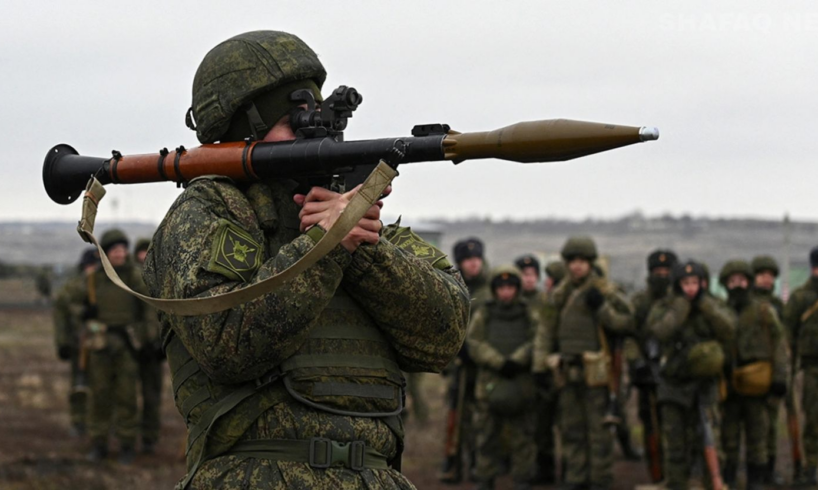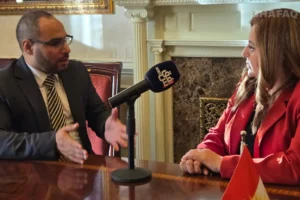
Shafaq News
More than three years into the Russia–Ukraine
war, thousands of young Iraqis have found themselves trapped on its frontlines,
lured by promises of steady income and European passage. Since 2022, deceptive
recruitment schemes have pulled over 5,000 Iraqis into combat roles in Russia
and Ukraine, exposing them to coercion, dangerous smuggling routes, and
contracts that bind them to a war far from home.
The Iraqi Embassy in Moscow has issued a rare
warning, urging its citizens to resist “attempts to entrap them in
participation,” and reiterating Baghdad’s official neutrality in the conflict.
The statement highlights the government’s growing concern that Iraq’s social
and economic fragility is being exploited by both sides in the war.
Pathways of Recruitment
Sources familiar with the networks told
Shafaq News that many Iraqis are drawn in through misleading travel offers.
Tourism companies in Baghdad and other provinces advertise budget trips to
Russia and European countries, sometimes even on installment plans. Once the
trips conclude, migrants are approached by brokers who promise lucrative jobs,
particularly as private security guards, with salaries of $2,500 or more.
In reality, most are pressured into signing
contracts with the Russian army. According to the same sources, “once the trip
ends, smuggling networks lure them into joining as fighters with the Russian
military, offering monthly wages of up to $3,000. From there, they are
dispatched directly to frontlines in Ukraine.”
“Others are abandoned along trafficking
routes. Groups attempting to reach Ukraine via Turkiye, Belarus, or the Balkans
often find themselves stranded in forests under severe weather conditions, left
to face hunger, exposure, and in some cases, death,” the sources said.
Iraqi Fighters on Both Fronts
Despite the risks, thousands have entered
combat under both Russian and Ukrainian command structures.
– Russia: Around 2,000 Iraqis are currently
fighting under formal contracts with the Russian army, according to Haider
al-Shammari, who describes himself as head of the Iraqi community in Russia. He
confirmed that most earn $3,000 monthly under legal agreements recognized by
Russian law, which allows foreign residents fluent in Russian to enlist.
– Ukraine: More than 3,000 Iraqis are believed
to have joined Ukrainian forces as contractors, typically recruited by
smugglers promising transit through Turkiye or Greece. Other sources told
Shafaq News that the agreed wages range from $2,000–$2,500. But many never
reach Ukraine; instead, they are left in border zones or forests, facing arrest
or death from exposure.
Families often remain unaware of their sons’
whereabouts. Some victims vanish entirely, while others are compelled to
continue as mercenaries to survive.
Many of those who joined Russian ranks have
since appealed to be repatriated to Iraq, saying they were misled into the war
and now want to return home, the sources said. “But their calls have gone
unanswered, leaving them stranded in a conflict that has consumed them since early
2022.”
The Embassy’s Intervention
On Friday, Iraq’s embassy in Moscow publicly
addressed the issue. In a statement received by Shafaq News, it warned of
“attempts to entrap young Iraqis into participation in the Russia–Ukraine war,”
stressing that no recognized Iraqi community leadership exists in Russia.
The embassy clarified that it does not issue
any entry visas related to these deceptive claims, and that the only legitimate
entry permits are handled by Russian diplomatic offices in Baghdad, Erbil, and
Basra.
It reiterated Iraq’s “firm position of
neutrality regarding the Russia–Ukraine crisis and its constant call for
peaceful solutions through dialogue.” The embassy urged Iraqi citizens to
exercise caution and vowed to pursue “diplomatic and legal measures” to protect
Iraqis from exploitation.
Divergent Government Responses
In Baghdad, the case has drawn mixed
reactions.Parliamentary Security and Defense Committee
member Alawi Hanzal al-Nadawi told Shafaq News that his committee is monitoring
reports of Iraqis serving as mercenaries, “If confirmed, we will raise the
issue in committee sessions and coordinate with relevant authorities to address
it. The Iraqi constitution prohibits making the country a source of aggression
against neighbors. It is unacceptable for Iraqis to fight as mercenaries for
Russia, Ukraine, or any foreign state.”
Yet the Ministry of Migration downplayed the
issue. Spokesman Ali Abbas Jahangir noted that travel under legal visas is
normal, but emphasized, “If lawful travel becomes a means of engaging in
mercenary activity, that is prohibited. The ministry does not have confirmed
information on Iraqis joining the Russian army or otherwise.”
War Context: Russia’s Advance, Ukraine’s
Strain
These developments coincide with a new phase
of the war itself. Between September 2024 and August 2025, Russia seized over
6,000 square kilometers of Ukrainian territory—three times its gains in the
previous year, marking its largest advance since 2022.
At the same time, President Vladimir Putin
warned on Thursday that Moscow could “resort to military options” if ongoing
negotiations with Kyiv collapse, asserting that Ukrainian reserves are nearly
exhausted. The comments came after the fading of diplomatic momentum from the
Alaska summit and subsequent talks in Washington.
Analysts believe this renewed escalation is
creating fresh demand for foreign recruits to replace Russia’s mounting
battlefield losses and Ukraine’s depleted manpower.
Why Iraqis Are Vulnerable
Iraqi analysts point to structural domestic
factors driving this phenomenon. Unemployment remains high, particularly among
university graduates who lack prospects in a sluggish economy. For many,
migration—whether legal or illicit—appears to be the only path to secure income
or European residency.
Smuggling and recruitment networks exploit
these aspirations. By advertising “safe passage” or jobs abroad, they entice
desperate young men into contracts that tether them to the frontlines of a war
they had no intention of joining.
As one source noted, “Iraq’s youth are not
leaving to fight; they are leaving to escape unemployment. But once abroad,
they are trapped into fighting as the only survival option.”
Written and edited by Shafaq News staff.





